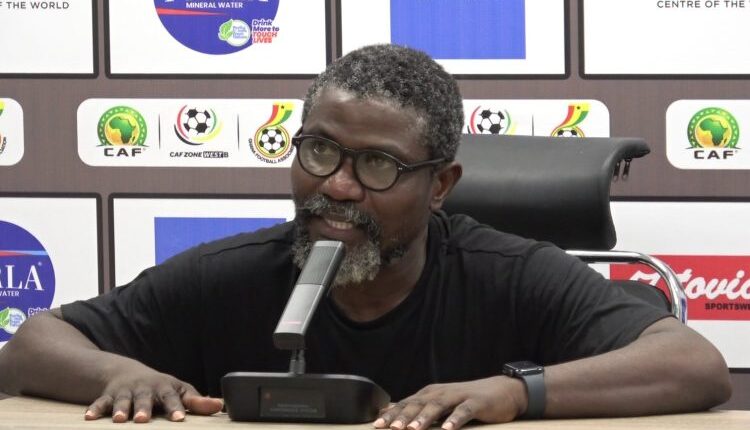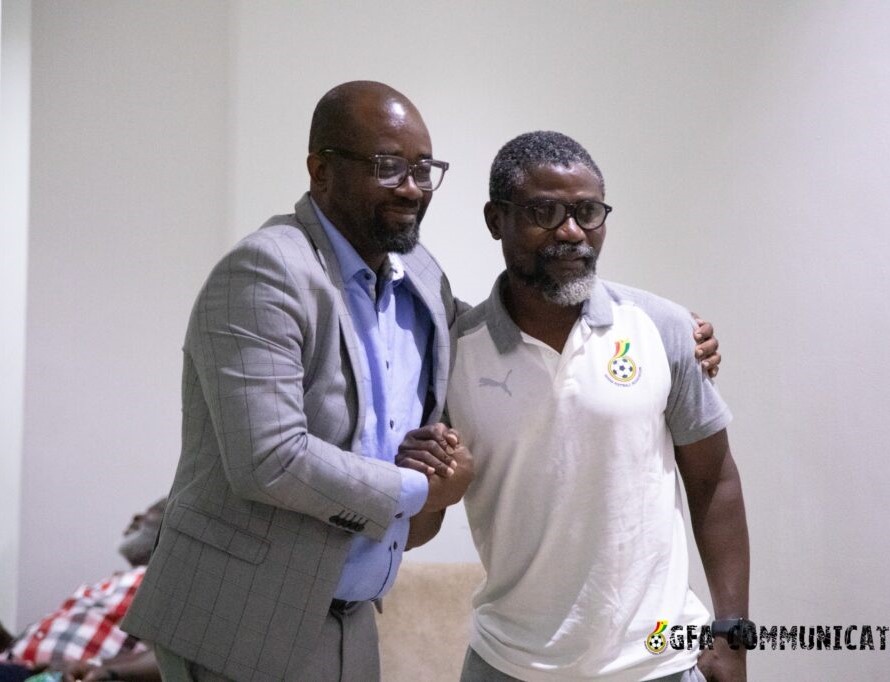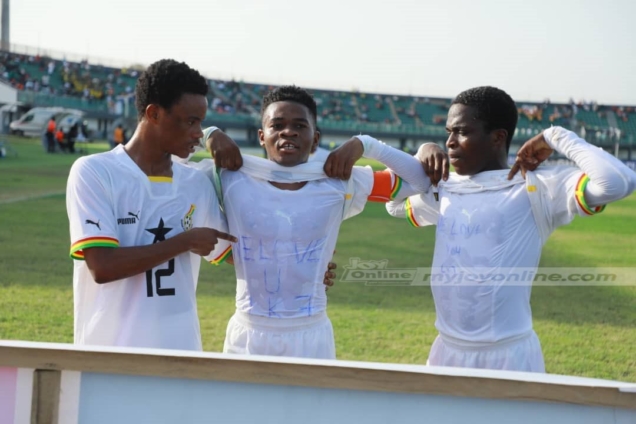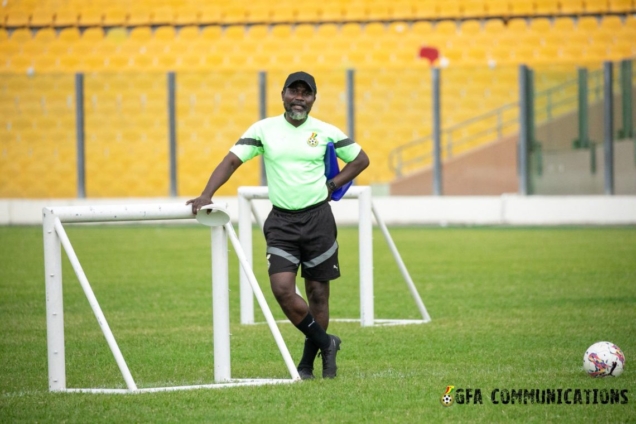Laryea Kingston might as well have turned off the lights on his way out of the University of Ghana Sports Stadium’s press-room after concluding his conference with journalists following the national U-17 team's penultimate game at the WAFU Championship last Saturday.
He had just, to the surprise of all and sundry, quit a job he had taken up just a little over a month prior. Kingston had inherited the position from the experienced Abdul Karim Zito, who he had previously assisted and understudied. That succession felt like a natural progression, with Kingston's familiarity with the lads making up for the fact that he was very much a rookie.
It didn't take him too long to gain the trust of his countrymen.
The first major assignment of his tenure, a duel with hosts Russia at the UEFA U-16 Boys Development Tournament in April, was lost 3-1, but the Black Starlets recovered to win their next two matches emphatically. It wasn't quite the flawless record that the group achieved at last year's edition (which they won), but, still, scoring 11 times in three games showed an exciting attacking edge that would serve them well in the team's next outing — the WAFU tournament mentioned at the outset.
There, the Starlets continued their impressive streak, routing Ivory Coast before beating Benin to top their group. It wasn't just the volume of goals that had Ghanaians thrilled; the quality of some of the strikes caught attention, too — most notably that wonderfully, patiently worked move finished by highly-rated youth Theophilus Ayamga against the Beninois.

Kingston, who earned his wings at the world-renowned Right to Dream Academy, rightly received a lot of credit for the irrepressible front-foot play of his charges. Many touted him as the next big thing on the local coaching scene, while some — including Asamoah Gyan, a former international colleague and arguably Ghana's premier footballer of the modern era — went as far as predicting Kingston would someday be recognised as “one of the best coaches in Ghana and beyond”.
It was, thus, with great expectation that the nation embraced the semi-final clash with Burkina Faso, the country that had stopped Ghana at the same stage at the tournament last time out. The Stallions succeeded in repeating the dose, however, courtesy of one Tapsoba goal either side of Joseph Narbi's equaliser for the Starlets. Defeat meant Ghana missed out not just on a place in the final, but also a first appearance at the U-17 Africa Cup of Nations finals in seven years.
Yet, despite the obvious disappointment, the country felt proud. The team's collective effort had restored hope in the Starlets, a side that Ghanaians have always had a soft spot for — mainly for being the first national team to conquer the world at any level, in 1991 (and then in 1995) — but which, in light of recent struggles, many had grown increasingly disillusioned with.
Kingston's efforts had rekindled the hitherto waning interest, and the popular feeling was that something beautiful was only just beginning; which is why Kingston's announcement, during his post-match encounter with the media, was a blow nobody -- but himself -- saw coming.

"I'm resigning after this tournament as under-17 coach,” Kingston told a stunned audience.
“I’d taken that decision already before this tournament started but the explanation will come out later.”
What came out much sooner, though, were details about Kingston's alleged misbehaviour in the aftermath of dropping that bombshell.
“Laryea Kingston's decision has been supported by his subsequent actions,” a release by the Ghana Football Association (GFA), acknowledging the 43-year-old's resignation, stated.
“Coach Kingston … got off the Team Bus whilst the team was on its way to the Team Hotel. He failed to attend the Team's evening meeting with the Management Committee and has since not reported at the Team Hotel.”

The GFA came under fire for deciding to bare it all, with some even accusing the organisation of throwing a diligent ex-employee under the bus (pardon the pun), but it is instead Kingston who has emerged to apologise for his own indiscretions.
“To the President and the [Executive Committee of the GFA],” he wrote, “I also want to unreservedly and sincerely apologize for any misunderstanding, inconvenience and embarrassment my decision to announce my resignation last Saturday caused.
“After careful consideration, I could have handled things better and this will be a guiding experience for me going forward,” Kingston added, before attempting to clarify some of the (in)actions he has been accused of by the GFA.
“Concerning any other issue about my personal conduct, with suggestions that I abandoned the team following last Saturday’s semi-final defeat to Burkina Faso, I state unmistakably, that my announcement during the post-match press conference was without ambiguity that my role as coach with the team ends after the tournament.”
The problem, though, was that the tournament had not ended yet: Ghana had one more game, a battle for third place with arch-rivals Nigeria mere days later, to go.
With so much — bronze and pride — riding on that match, Kingston had effectively jumped ship, leaving his team prematurely shorn of a much-loved father figure and mentor. The players, though, retained affection for him, putting that on full display after scoring in the ensuing 3-2 defeat to the Nigerians.

Whether their paths would ever cross again at international level, though, remains to be seen as the years go by.
This may be the end of the road for this class of Starlets, but several of these teenagers — the likes of Ayamga and skipper Benjamin Tsivanyo — should go on to have fine careers and represent the country as they continue to develop and make steady progress.
Kingston, too, may well fulfill the ‘prophecy’ of Gyan et al., yet it may be a while — if ever — he gets a go at another national team role, given the manner of his departure. Whatever his reasons for heading for the exit in such unceremonious fashion — genuine though they may be — Kingston might come to regret it.
As a player, refined as he was on the ball, Kingston always wore his heart on his sleeve so much that he never was too far away from controversy. To maximise his chances of finding greater joy and success as a coach than he did during those playing days of his he still speaks bitterly about, Kingston would have to trim those excesses and learn to operate with a cool, level head — all without quenching the fire in his belly, of course.
That would do everyone — himself, his well-wishers, and a country he still has plenty to offer — a world of good.
Latest Stories
-
Miracle in Madina: Woman declared dead in Hajj returns home, stirring community shock
3 hours -
Mobus CEO apologises to Nigerian Police over Abuja land row, distances firm from protest at Nigerian High Commission in Accra
5 hours -
Experts urge institutionalisation of evidence-based health policies in Ghana
5 hours -
Government to convert National Cathedral site into National Cultural Convention Centre
5 hours -
Former Sports Minister Mustapha Ussif loses sister
6 hours -
Ayoum community appeals for fixing of collapsed bridge to ease commuting
6 hours -
Full text: Mahama’s speech at the Post-Election Evaluation Dialogue
6 hours -
Kumasi: 545 police personnel pass out to support 24-hour economy
6 hours -
No Ghanaian child will be denied tertiary education because of fees – Mahama
7 hours -
Ghana, U.S. reaffirm strategic ties at 249th Independence Day celebration
7 hours -
Full text: Mahama’s speech at launch of No Fees Stress policy
7 hours -
President Mahama promises justice for electoral violence victims
7 hours -
JoyNews Impact Maker awardee nominated for Global Citizen Waislitz Award, vote for him to win $100,000
8 hours -
Partey has fully cooperated with police throughout three-year investigation – Lawyer Jenny Wiltshire
9 hours -
Thomas Partey denies all the charges against him – Partey’s lawyer Jenny Wiltshire
10 hours

